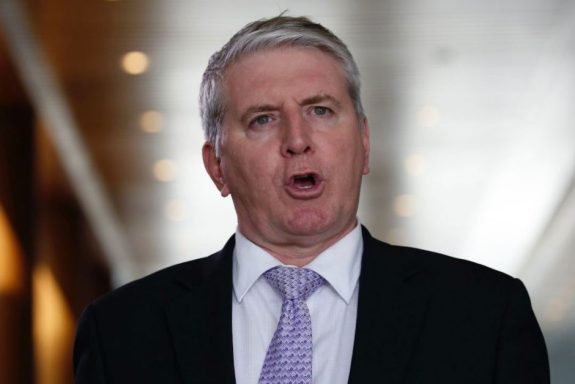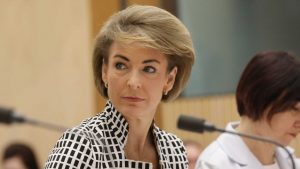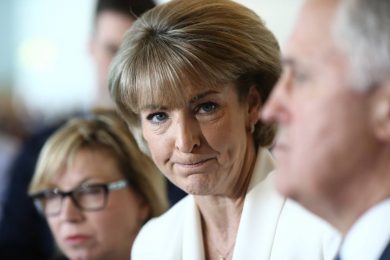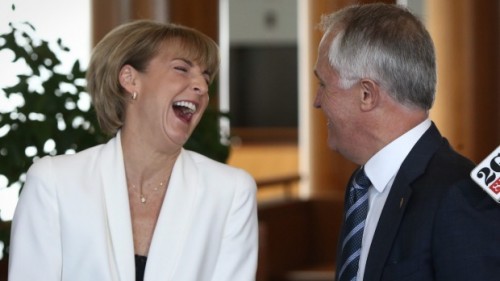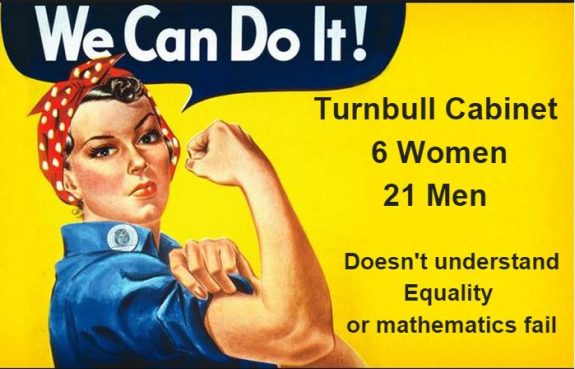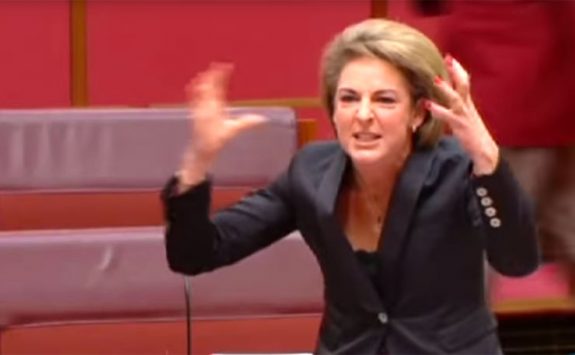Today we welcome a new Minister for Women – Senator Michaelia Cash. In December 2013, I wrote a letter to the then Prime Minister and Minister for Women, Tony Abbott. I outlined quite extensively my concerns for legal discrimination and discrimination by default. I received a very prompt response from Senator Claire Moore of Labor which was very comprehensive and addressed all of my concerns.
However, I still awaited a response from the Minister for Women who said that “Women do not suffer legal discrimination in Australia.” After months of requesting a response, Senator Larissa Waters from the Greens took up my case via email to me. Finally, in April 2014 I received a response from Senator Michaela Cash, Minister assisting the Minister for Women. I thank Senator Waters for her tenacity and persistence.
Senator Cash advised me in her letter that the Liberal National Coalition is “committed to delivering policies that ensure both women and men have equal opportunities to contribute to society and live free from all forms of discrimination.”
In her letter to me, she also praised the work of Sex Discrimination Commissioner Elizabeth Broderick and noted, “Elizabeth Broderick has demonstrated leadership on a number of issues raised in your (my) letter.”
Elizabeth Broderick’s term as Sex Discrimination commissioner ended in September 2015 and to my knowledge a replacement is yet to be appointed. The Attorney General, George Brandis told the Debrief Daily, that a replacement was under consideration, but no announcement at this point. This is just two days prior the Commissioner’s post being vacated. The Office for the Minister for Women does not appear to be keen to source and push for a replacement, knowing a vacant chair was imminent, for a Commissioner who has done such great work.
Senator Cash also advised me in her letter that her Government has also “Made a number of commitments that will seek to drive forward gender equality in Australia.” Senator Cash then outlined a number of policy priorities. As this is 15 months after this letter was penned, let’s have a look at Senator Cash’s responses and how they stack up. I see these as challenges for the new Minister for Women:
Relocating the Office for Women – This was advised by Senator Cash to be one of the “first priorities and a key election commitment.” Senator Cash advised that this will “Strengthen a whole-of-government approach to providing better economic and social outcomes for women and sends a strong message across government about the need to consider women in the development and implementation of policies and programmes”
How did this stack up? – Unfortunately, this priority has not achieved the outcomes it said it would. The strong message sent across government with one, then two women in Cabinet reduced this strong message to a whisper. When we take into consideration the number of women in Cabinet who identify as a feminist and actually sincerely believe in gender equality then this strong message is merely tokenism and placed on mute.
At the time of Senator Cash’s response, women in leadership roles were sparse. However, today, the new Prime Minister has now in increased the number of women in cabinet to six, which is now a makeup of 22% women and 78% men. This still leaves a lot to be desired in terms of commitment to policy input by women.
The better social and economic outcomes are not evident from this move and there are quite a number of budget cuts and policies, which are harmful to women. Cuts to family payment, the attacks on government paid parental leave, cuts to funding to community services such as “Girls Time Out” in my community, which assists young pregnant mothers to name a few. (GTO has since been refunded after a fight brought on by the State Labor member for Keppel).
Pregnancy discrimination, Paid Parental Leave and Lifetime Earnings – Senator Cash agreed with me that we must reject discrimination against pregnant women in the workplace. Senator Cash then outlined the Liberal’s panacea for all things women – the Paid Parental Leave Scheme and directed me to a report by the Sex Discrimination Commissioner’s Supporting Working Parents: Pregnancy and Return to work National Review.
However, Senator Cash did not mention in her letter that this review was instigated by the Attorney General on 22nd June, 2013; which at that time was Labor’s Mark Dreyfus.
On 22 June 2013, the Attorney-General’s Department asked the Sex Discrimination Commissioner, on behalf of the Australian Human Rights Commission to conduct a national review on the prevalence, nature and consequences of discrimination in relation to pregnancy at work and return to work after parental leave.
How did this stack up? – As we know the Liberal’s panacea to all things women, the PPL, was abandoned by the Government and they also went on an attack on women who had already bargained with their employer for PPL and screamed that they were ‘double dippers.’ This is a derogatory term, aimed to stigmatize women. Not the Government’s greatest achievement.
As per the pregnancy discrimination issues raised in my letter; as discussed above, it appears the Liberal Government has done no work of its own in this area and the work was commissioned by Labor. The findings certainly have not been in the forefront of the Government’s agenda and to this point remain relatively silent, unless you make an active choice to read the report.
Productivity Commission Inquiry into Childcare – Senator Cash directed me to the Productivity Commission Inquiry into childcare. At this point, it was in the early stages and was not expected to be finalised until February 2015. I found this inclusion a little confusing. I had not raised any specific concerns about childcare affordability etc., in my initial letter. My concerns were mainly specific to the discrimination of pregnant women in the workforce, the impacts of the casualisation of women and the impacts and discrimination experienced by women returning to work from maternity leave. The questions I raised were not specific to the childcare framework, but more focused on missed opportunities for training, promotion and leadership, breastfeeding discrimination and negative and inappropriate comments from managers and supervisors. However, after a review of the Productivity Commission Inquiry into Childcare recommendations, none of these recommendations addressed my concerns.
How did this stack up? – In this instance, the Minister assisting the Minister for women, read my concerns as affordability of childcare and did not address some of the ingrained cultural issues within workplaces, enabled by existing legislation to redress discrimination for women in the workplace. Although, the recommendations have not been developed into policy at this stage, some of the recommendations concern me within the wider framework.
The recommendations aim to encourage all mothers to return to work. There is little support in terms of policy direction from the Government for women to stay at home. Under both the Liberal and the Labor Governments, the choice to mother at home has been taken away from women who want to provide a stable, continuous home environment for their children, by forcing mothers to return to work. In regional areas, there is not the support structures, transport infrastructure or jobs to place this additional burden on single mothers. Some mothers from low socio-economic backgrounds do not have their own transport or support network. This policy direction does not place women at the centre of the debate and should be a supported choice to return to work, not a regulated forced requirement to obtain income to support self and child/ren, which in my view discriminates against women who want to make the choice to stay at home. This choice is afforded to wealthier women, who have the privilege of a second income that can sustain both mother and child at home.
The entire policy framework of women and work is from one of ableism and is not supportive of women with a disability. With no Disability Commissioner and none named in the new Turnbull Cabinet Ministery, I fear this will not be redressed.
Another concern is that childcare payment is always viewed as a combined income situation. To overlay this against the concerns we have at present with the rise of domestic violence, I strongly believe it would be pertinent for the government to review this to support women to be able to independently earn their own income. Not all women, have access to income or shared income in all situations and financial control is a common factor amongst victims of domestic violence. Please view the recommendations linked above.
Women on Boards – Senator Cash outlined in her response that “the Government is committed to supporting women into leadership roles, and we are engaging with the business and community sector to support women’s representation of leadership and on boards.” Senator Cash also informed me that the government is engaging with the National Women’s Alliances.
How did this stack up? – Senator Cash advised they were working with the National Women’s Alliances. This alliance was formed by the Gillard Government in 2010. Senator Cash may not have known at the time of her response to me, but regardless, this alliance’s funding will now cease in 2016. As a woman from a regional community, I hope as Minister for Women she will announce the refunding of this alliance.
Violence against women – Senator Cash assured me that, “A key priority of our policy agenda is to ensure that women and their families are safe from violence.” Senator Cash also reassured me that they are continuing with the previous Labor plan to reduce domestic violence. I also note that Senator Cash advised that they have increased funding to White Ribbon.
How did this stack up? – The nation is aware that we have a domestic violence epidemic with a very high number of women violently murdered in a domestic violence situation so far this year. The Government has remained relatively silent on this issue and has not championed any real commitment to assisting women at risk of or fleeing domestic violence. Some of my concerns: cuts to family payment, increasing financial pressure in homes, the four-week waiting period for Newstart, which will see young women at risk of homelessness and violence, the cuts to Indigenous legal aid (now refunded), cuts to community programs which are vital to support for young women. The increasing casualisation of women in the workforce, providing little stability for families and the lack of seriousness in responding to developing a committed immediate framework and funding much needed and required services.
Women at Risk – This is a response to women fleeing as asylum seekers and the discrimination within the current processing framework (for more detail see original letter linked in the opening paragraph). Senator Cash advised that they have a “Continuing objective of the empowerment of women” and they have increased 1000 places for women at risk in their humanitarian intake.
Senator Cash also advised that “the Government will ensure that Australia’s refugee and humanitarian resettlement program provides places to those we can help most and those most in need.” Senator Cash did recognise that women and children are the most vulnerable in this group and “deserve to be given a very high priority in Australia’s refugee and humanitarian program.”
How did this stack up? – To date, the Government has been marred by accusations of the inhumane treatment of asylum seekers. The Human Rights Commissioner’s report and Senator Hanson Young’s vocal reporting into the conditions in camps and other professionals speaking up about ill-treatment and abuse, physical and sexual of women in camps, the secrecy and lack of empathy by the Government gives me no confidence at all that the Office of Women considers women seeking asylum, with any seriousness or commitment. This needs to be urgently addressed, in light of recent developments.
What was not addressed in Senator Cash’s response
There were a number of areas not addressed at all in Senator Cash’s response to my original letter. These are discrimination for women pertaining to the areas of:
- Rape and the Justice System
- Denial of right to safety
- Casualisation of the workforce and insecure employment
- Gender Pay Gap, including lower wages in ‘traditional women’s industries’
- Superannuation
- Marriage Equality
- Indigenous specific issues I outlined relating to many of the above areas and support for mothers and children of the stolen generation.
- Abortion Law
- The under-representation of women in Parliament
How did this stack up? – Frankly, I felt a long-awaited response from the Government, which took the tenacity of Senator Larissa Waters to take up my cause and finally receive a response from the Office of Women months later, was disappointing to receive so many areas not addressed. Also, as you can see in the other responses outlined above, I was disappointed that the Government claimed ownership of Labor initiated programs and reviews, through absence of this information and 15 months on, no real progress in policy to redress discrimination for women.
I will never know if the former Prime Minister and Minister for Women, still believed that “Women do not suffer legal discrimination” after considering the matters raised in my original letter, as this was not addressed.
Where to now? – I hope that the new Minister for Women does believe that women do indeed suffer legal discrimination and discrimination by default. Personally, after Senator Cash’s tirade on the ‘sisterhood’ in the senate, my personal preference would have been Marise Payne to take on this role, as I believe Senator Payne has spoken out on a number of occasions with seriousness on issues that women face. I hope as Minister for Women, Senator Cash changes her rhetoric and attack as displayed in this this vdeo. Otherwise, she cannot be taken seriously in this role.
I hope that now Senator Cash is the Minister for Women, she has more scope to tackle head on some of these areas that need to be addressed urgently.
I fear that the impacts from the Government’s wider policy in welfare, humanitarian programs, social support programs, education and health are ingrained in an ideology harmful to women. I seriously doubt many of these areas I have outlined as my concerns for equality for women can be redressed, as these wider policy frameworks coupled with the rhetoric and narrative of the Government can and do act as antecedents and enablers of discrimination to women.
I strongly believe that the liberal and conservative ideology of the Liberal National Coalition impedes and prevents proper progress in the area of equality for women and a change of Government is the only solution. However, only time will tell.
Originally posted on Polyfeministix
Like what we do at The AIMN?
You’ll like it even more knowing that your donation will help us to keep up the good fight.
Chuck in a few bucks and see just how far it goes!
Your contribution to help with the running costs of this site will be gratefully accepted.
You can donate through PayPal or credit card via the button below, or donate via bank transfer: BSB: 062500; A/c no: 10495969

